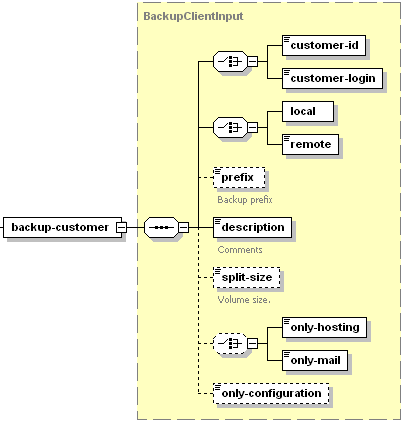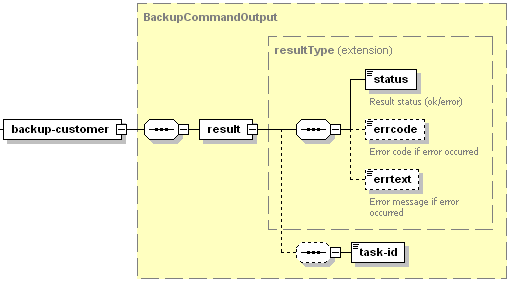Creating Customer-level Backup Task
Use the backup-customer operation to create a customer-level backup task.
Request Packet Structure
A request XML packet creating a customer-level backup task includes the backup-customer operation node:
<packet>
<backup-manager>
<backup-customer>
...
</backup-customer>
</backup-manager>
</packet>
The backup-customer node is presented by type BackupClientInput (backup.xsd), and its graphical representation is as follows:

- The customer-id node is required. It specifies the customer ID. Data type: integer.
- The customer-login node is required. It specifies the customer login. Data type: string.
- The local node is required. It specifies if the backup will be stored in the local storage. Data type: none.
- The remote node is required. It specifies if the backup will be stored in a remote storage. Data type: string "ftp".
- The prefix node is optional. It specifies the backup name prefix. Data type: string.
- The description node is required. It specifies the description of the backup. Data type: string.
- The split-size node is optional. The parameter specifies size of fragments (in Kb) into which the backup is partitioned. Data type: integer.
- The only-hosting node is optional. The parameter instructs Plesk to exclude mail accounts content from the webspaces content added to the backup. Data type: none.
- The only-mail node is optional. The parameter instructs Plesk to add only mail accounts content to the backup. Data type: none.
- The only-configuration node is optional. The parameter instructs Plesk to include only customer-level configuration into the backup. Data type: none.
Note: If you do not want to split backup into several files, the split-size value should be set to 0.
Important: When creating request packets, put nodes and elements in the order they follow in the packet structure.
Response Packet Structure
The backup-customer node of the output XML packet is presented by type BackupCommandOutput (backup.xsd) and structured as follows:

- The result node is required. It wraps the response retrieved from the server. Data type: resultType (
common.xsd). - The status node is required. It specifies the execution status of the operation. Data type: string. Allowed values: ok | error.
- The errcode node is optional. Is returns the error code if the operation fails. Data type: integer.
- The errtext node is optional. It returns the error message if the operation fails. Data type: string.
- The task-id node is optional. It returns the backup task ID if the operation succeeds. Data type: integer.
Samples
Creating a backup task to perform a customer-level backup of a customer account
The following request packet creates a backup task which instructs Plesk to perform a customer-level backup (without splitting) of the customer account with ID 18.
<packet>
<backup-manager>
<backup-customer>
<customer-id>18</customer-id>
<local/>
<description>Standard weekly backup</description>
<split-size>0</split-size>
</backup-customer>
</backup-manager>
</packet>Response:
<packet version="1.6.7.0">
<backup-manager>
<backup-customer>
<result>
<status>ok</status>
<task-id>2</task-id>
</result>
</backup-customer>
</backup-manager>
</packet>
Creating a backup task to back up customer-level configuration of customer account
The following request packet creates a backup task which instructs Plesk to back up customer-level configuration of customer account with ID 18.
<packet>
<backup-manager>
<backup-customer>
<customer-id>18</customer-id>
<local/>
<description>Standard weekly backup</description>
<split-size>0</split-size>
<only-configuration/>
</backup-customer>
</backup-manager>
</packet>Response:
<packet version="1.6.7.0">
<backup-manager>
<backup-customer>
<result>
<status>ok</status>
<task-id>2</task-id>
</result>
</backup-customer>
</backup-manager>
</packet>